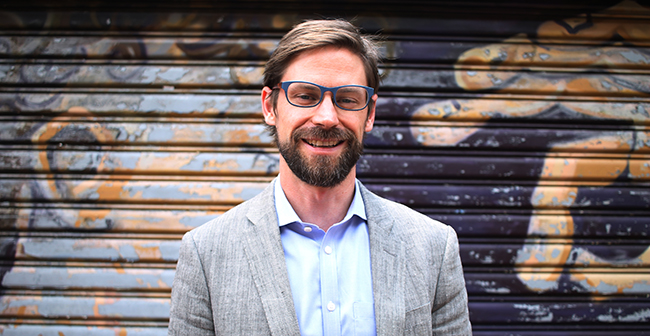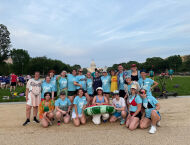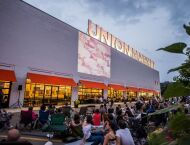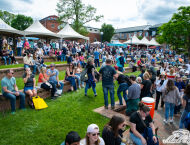Culture
 Photo: Trent Johnson
Photo: Trent Johnson
Andrew Trueblood Brings Energy, Earnestness and Millennial Outlook to DC Office of Planning
August 2, 2019 @ 12:00am
There is an earnestness that exudes from Andrew Trueblood. The 36-year-old director of the DC Office of Planning (OP) – the first millennial tapped for that role by Mayor Muriel Bowser last November – has already made quite an impact on the city, garnering praise from his peers committed to preserving the cultural heartbeat of the District. With 15 years of city life and six of District government experience under his belt, he brings deep understanding of and affection for the nation’s capital to the table. Though his ultimate goal is to overcome the city’s growing housing gap and produce affordable housing across all wards, Director Trueblood is also an advocate for preserving the city’s authenticity through initiatives like those born from the first-ever DC Cultural Plan, released by Mayor Bowser in April. I sat down with him to dig into how being an “elder” millennial – his words, not mine – uniquely positions him to connect with the local community, how to tackle tougher issues impacting the city like gentrification, and his love of cycling, theatre and trying Michelin star restaurants.
On Tap: How would you describe your experience running the DC Office of Planning thus far? What have been the biggest challenges? Successes?
Andrew Trueblood: I’m excited to see Planning take the role that I think it ought to take given all of the challenges that we’re facing across the city. I’m excited to work closely not only with the Mayor but also be hand-in-hand with [other agencies]. Those connections have helped elevate our work and make sure that what we’re doing is aligning across the government but also achieving results that are important. We do have to think about all of these tradeoffs between growth and equity – between what we’re asking of residents and what we need to get things done. Because we can take that broader view, we can provide other agencies the needed information for them to make long-term decisions that are moving us in the right direction.
OT: So you get to be a little higher level and think big picture.
AT: Yeah. What we’re trying to do is both [high-level] work, which is incredibly important, but then tie it to tangible deliverables that residents can feel. Some of that is by thinking about how we engage residents, but it’s also about continuously engaging, releasing intermediate results and findings. [For example], we’ve released a map, which shows where affordable housing is and is not in the city. As we find things, we want to keep sharing them and keep the conversation going. The beauty of the way that media works today is we can have that kind of ongoing dialogue with the community.
OT: How does being director-level in District government as a millennial uniquely position you to support the city through the lens of younger professionals and city dwellers?
AT: My goal is to be able to hear from, understand and articulate the needs and values of every resident. That is the mandate and it requires a degree of empathy. The other thing that is different in the workplace now than before is iterating [and] being okay with trying things and maybe failing. That idea of quicker turnarounds, iterating and building is something I’ve always found to be a valuable way of getting things done, and I’m trying to bring that to this office.
Can’t Live Without
Outdoor activities with family and friends
My bike
The District, especially its amazing arts and culture
Coffee in the morning and nachos in the evening
Podcasts and audiobooks from DC Public Library
OT: How do you connect with the local community to make sure you’re keeping a pulse on what’s happening and stay relatable?
AT: What I’ve learned – actually more since I took this role than when I was [Chief of Staff at the Deputy Mayor’s Office] – is a lot of people appreciate that I am accessible and available, and will listen and try and make the mechanics of government move. I am trained as a planner, I have a degree, I’ve been in the city for 15 years. But that doesn’t necessarily mean that I know all the things. I think being authentic and honest when I engage with residents or stakeholders is really at the base of how I’m trying to do this. I’ve gone out to groups that have been very critical of the Office of Planning. My goal is to be honest with them about what we want to try to do [and] try to find places of commonality that we can work together in. Sometimes, honesty means saying hard things or saying when we disagree.
OT: How important is it to you to make those connections in the community and keep them, and how do you integrate that into your role and decision-making process in local government?
AT: One thing I learned early in my public service career is often times, it’s very easy to say something that will make someone happy now but will make that official a liar in the future. [If I] say something now to take the heat off today but then in the future, people might feel like I was not honest with them. It’s more important to be honest today than to potentially lose that trust. So building that trust across the different groups I think is really important, especially in Planning where we are balancing all of these competing interests.
OT: The District has changed so much in the past decade – we’re on the foodie map nationally, plays are coming here to make their pre-Broadway debuts, venues like The Anthem are opening. From the OP perspective, do you see anything problematic about how this impacts our economic landscape or do you view it as exciting and embrace the changes?
AT: It is problematically good. The health of a city is about its ability to have amenities and grow and serve its residents. I think having good restaurants, entertainment and arts and culture is all critical. Our schools have improved over the last 15 years. Our [health care] facilities are top-notch. Our libraries are amazing. We as a city need to grow in order to utilize the infrastructure we have. We can control structures, but we cannot control souls. We can [choose] not to build things, but that doesn’t mean that people who have wealth won’t want to live in the city. If you have the same number of structures and more people with wealth coming in, that exacerbates gentrification. We need to figure out how we grow as a city. We have the chance to be very thoughtful about what growth and development look like.
OT: Do you have concerns about DC becoming gentrified and up-and-coming neighborhoods losing their heartbeat, affordability and accessibility of the locals as younger, wealthier professionals move in? How can the city combat that through OP initiatives?
AT: I am very worried about housing costs and the ability for residents – especially low- and moderate-income residents, residents of color, longtime residents – to be able to keep their homes. Gentrification is a lot more challenging to discuss because it is multifaceted. We’re trying to produce 36,000 housing units by 2025 [and] we think 12,000 of those need to be subsidized. I worry that by focusing on a few neighborhoods, we lose sight that the forces happening are often broader. The discussion about gentrification could take us away from thinking [about] the programs and policies we need across the city.
OT: What initiatives are you supporting or leading to create affordable housing options for locals?
AT: The Mayor made the funding and programs around housing the cornerstone [of her first administration]. I think for [her] second term, [we’re] taking a step back and addressing some of these more systemic, structural questions. Why haven’t we been able to produce the housing across the income spectrum? How do we make sure our programs are aligned to produce the housing we need for the residents who need it most and what are those needs? We are working on a housing framework for equity and growth. We’re looking to see how we [can] address these housing needs in different parts of the city.
OT: Walk me through your involvement with the DC Cultural Plan. Why do you view it as important to the city?
AT: I think culture is […] what makes a city what it is. It’s part of its DNA. I think recognizing culture as its own important value and concept is what this plan seeks to do and then also to build on that. I think that, as a touchstone, is really important. I think it’s also fascinating that this came out about a week before a lot of the #DontMuteDC protests started happening. There’s a two-page opening about black culture, for example, as an important piece of the city’s authenticity. I think as a broad statement, [preserving authenticity] is what the Cultural Plan is about. It’s stating why we are vibrant and a unique place and not just any other city.
OT: What value do you think the plan’s funding recommendations bring to the city’s creative community?
AT: There are some very tangible recommendations put in place around different ways to think about funding. I don’t think it was ever meant to say we shouldn’t use grants. Grants are obviously an important piece of any support for the arts. There are untapped resources that we can tap if we create these new programs, and so there were different loan funds proposed. I’m hoping that it’ll continue to be an important guiding document and help guide how we think about culture in the city and cultural investments.
OT: Are there initiatives you’d like to pursue in the coming year that may not be on the public’s radar yet, but that you feel passionately about and would like to share?
AT: The thing I spend the most mental energy on is housing. It touches everybody. I’m trying to help have a two-way conversation. Everyone has their own housing story [so we are] thinking about how we use those stories and experiences to drive our analysis and to drive our policies. It’s clear that there’s a deep housing gap. We’re not producing the housing [that we need to] as a growing city. If in the next six months, we can do things to think about how to overcome that gap and bend the curve of housing and affordable housing production, I think that’s the biggest win we could have.
OT: What do you do for fun in DC when you aren’t working?
AT: It’s amazing to see the growth of the food scene. I have my food tracker. I track how many of the Michelin star restaurants that I’ve been to, and that’s fun. The biggest thing I do outside of the office is cycling. I love long rides and seeing the world, but I also love riding around the city – whether it’s on a Capital Bikeshare or my city bike. I love the theatre scene in DC. I’m a Woolly Mammoth subscriber. I love Fringe. I love that Fringe is growing and bringing a whole other crew of people and interest to theatre.
Stay in the loop with OP initiatives at www.planning.dc.gov and follow Director Trueblood on Twitter @atrueblood.







